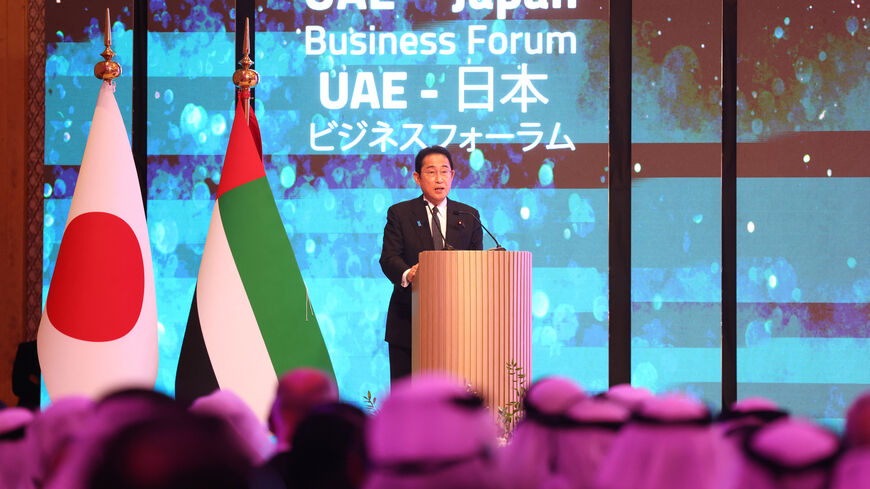Japan’s Prime Minister Fumio Kishida arrived in the United Arab Emirates (UAE) on Monday on the second leg of a Gulf tour aimed at securing energy supplies to Tokyo and offering the countries of the region Japanese green technology.
Ahead of his arrival to the UAE, Kishida said in an open letter carried by state news agency WAM that he plans to offer Japan’s “cutting-edge decarbonization technologies” as part of a green energy initiative for the Middle East, under which Tokyo and Abu Dhabi will cooperate in the fields of “hydrogen and ammonia production and utilization as well as carbon recycling.”
Emirati President Sheikh Mohammed bin Zayed Al Nahyan hosted Kishida in Abu Dhabi for talks focused on bilateral cooperation and the latest regional and international developments, WAM said.
During the meeting, Sheikh Mohammed said he was looking forward to Japan’s participation at the COP28 UN climate conference — which Dubai will be hosting in November. He further praised Japan’s active role in promoting climate action, according to WAM.
Tokyo and Abu Dhabi also signed a number of agreements in various fields related to space activities, technology and renewable energy, among others, the agency reported.
Kishida will be attending an Emirati-Japanese business forum later on Monday before traveling to Qatar on Tuesday.
The Japanese premier kicked off his Gulf tour over the weekend with a stop in Saudi Arabia. A total of 26 agreements in the fields of health care, clean energy, mining and digital innovation were announced during a Saudi-Japanese roundtable in Jeddah on Sunday, attended by Kishida and Saudi Minister of Investment Khalid al-Falih, among other officials.
Kishida was later received by the kingdom’s de facto leader, Crown Prince Mohammed bin Salman. The official Saudi Press Agency (SPA) said the pair discussed bilateral ties and ways to boost them.
During their meeting, the two also agreed to establish the KSA-Japan Lighthouse Initiative for Clean Energy Cooperation that “aims at showcasing Saudi Arabia and Japan’s leadership in clean energy projects and sustainable advanced materials, as well as ensuring the resiliency of the supply chain to ensure sustainable and secure supplies,” according to a joint statement carried by SPA.
Also on Sunday, the Gulf Cooperation Council (GCC) and Japan on Sunday agreed to resume negotiations on a free trade agreement between the two sides in 2024, according to a Japanese-GCC joint statement. The talks began in Tokyo in September 2006 before they were suspended in 2009 due to a disagreement over several points, including tariff exemptions.
Japan is working to diversify its energy sources as it moves toward green and renewable energy. According to the Japanese government website, Tokyo aims to achieve carbon neutrality by 2050. Last month, the government announced a plan to invest 15 trillion yen ($107.5 billion) over the next 15 years to develop hydrogen as a means to shift toward a low-carbon economy.
According to the US Energy Information Administration, Japan is the world’s fifth-highest oil consumer. In 2022, 93% of its total crude oil imports came from the Middle East — 42% of which were from Saudi Arabia and 34% from the UAE, as per the same data.
In 2021, Japan imported 13% of its liquefied natural gas (LNG) needs from Qatar. But this share decreased to 4% in 2022, after Japanese power company JERA ended a 25-year contract with Doha for the purchase of 5 million tons of LNG a year, after Qatar refused JERA’s request for a shorter contract.
Last week, Japan Gas Association (JGA) chairman Takahiro Honjo expressed hope that Kishida’s trip to the region would help the country secure long-term supplies of LNG.
“Qatar is probably one of the promising supplier candidates … but it is up to each company to decide the procurement policy by looking into conditions such as time frame and prices,” he told reporters.








